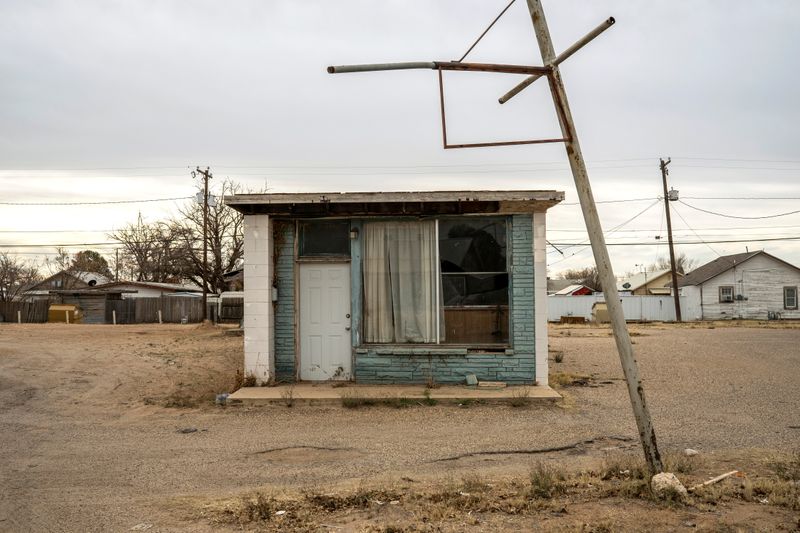By Brad Brooks
LAMESA, Texas (Reuters) - Running in between patients, Dr. Eileen Sprys pauses to catch her breath, tries to gather herself, but cannot mask her frustration: The health care workers in her COVID-besieged West Texas hospital were left out of the first shipment of the Pfizer (NYSE:PFE) and BioNTech vaccine, and they have no idea when they may get it.
Not a single rural hospital in this state that prides itself on its country roots received any doses of the vaccine this week, despite such medical outposts serving around 20% of the state's population, or 3 million people.
Even before the pandemic, rural hospitals in Texas and many other states were operating on "skin and bones" staffing and budgets, Sprys said.
"We're all exposed all the time," she said. "We don't have an isolated COVID wing or staff only dedicated to COVID unlike in larger hospitals. To not be included in the first shipment of vaccines is just so upsetting."
This isn't the first sign of inequality in the pandemic. Rural and urban poor residents across the U.S. have lamented not receiving treatments and medications as the better off, nor the quantity or quality of testing.
Sprys, her three fellow doctors and the 28 members of the nursing staff at the Medical Arts Hospital in Lamesa have been looking forward to the vaccine for months, hoping it would bring relief to Dawson County.
One of the poorest counties in Texas, nearly a quarter of Dawson's 13,000 residents live in poverty. To date, it has seen 1,325 coronavirus cases and 44 deaths, according to the state health department's count.
Rural hospitals around the nation, and particularly in Texas, have faces widespread closures after years of budget cuts. Some 27 rural hospitals have closed in Texas in the past decade - double that of any other state.
If it weren't for a $10 billion federal stimulus aimed at rural hospitals nationwide in May, another half dozen small Texas facilities would have closed, estimated John Henderson, the president of the Texas Organization of Rural and Community Hospitals.
NEEDLES IN ARMS
The Texas Department of State Health Services is tasked with allocating where the vaccine goes. A 17-person expert panel is charged with delivering recommendations on allotments to the state's health commissioner, Dr. John Hellerstedt, who has the final say on deliveries.
In a Dec. 14 letter sent to rural health advocates, Hellerstedt praised their patience and wrote that a "more inclusive" strategy of who gets vaccines will begin next week and that the pending approval of the Moderna (NASDAQ:MRNA) vaccine would help alleviate rural shortfalls.
Late Friday, state health services announced that Texas was receiving 460,500 doses of the Moderna vaccine from the Centers for Disease Control - and that much of it would be delivered to rural areas next week.
However, the doctors in Lamesa were still left off the list.
Chris Van Deusen, a spokesman for state health services, said there were two big reasons why rural areas were left off the initial Pfizer vaccine shipments. The first is that the smallest shipment contains 975 doses, so the state sent it to hospitals who said they had that many health care workers to inoculate.
The second is that the Pfizer vaccine needs to be stored in special freezers, which larger facilities were more likely to have. But that reasoning irks the doctors in Lamesa as their hospital had purchased one of those freezers in anticipation.
The Moderna vaccine, Van Deusen said, is easier to store and will be able to be shipped with a minimum of 100 doses, meaning it can go to smaller hospitals.
Time is of the essence, said Henderson, of the Texas Organization of Rural and Community Hospitals.
"You have one doctor out because of coronavirus in a small town, and that may mean you just lost half of your medical staff," he said.
Henderson said the state should embrace alternatives - such as having regional medical centers not vaccinate lower-risk staff, and instead earmark some doses for the frontline rural doctors and nurses.
'ANSWERING THE CALL'
It's difficult to recruit doctors to work in any small town, and those that do are considered the crown jewels of their communities. Many residents interviewed in Lamesa said they were adamant that their medical staff should be protected immediately.
Debbie Aylesworth, 67, credits Sprys and the staff at the Lamesa hospital with keeping her off a ventilator when she had COVID-19 a few months ago. After Aylesworth was exposed to the virus in October, Sprys texted her daily to ask if she was having any symptoms.
If not for Sprys' insistence, Aylesworth said she likely would have delayed seeking treatment and ended up being far worse off.
"Those doctors are answering the call," she said. "They are dealing with the worst of what this pandemic is dishing out, so they should be seeing the benefit of the vaccine."
Josh Stevens, the mayor of Lamesa, said the area has been as brutalized by the pandemic as anywhere else in Texas.
Making matters worse, he said, is that about 85% of the town's population is considered part of the essential work force - most working in agriculture along with oil and gas - meaning more of Lamesa's citizens have been out on the frontlines.

"Most people in Lamesa have had nowhere to hide from this virus, and our doctors have had to deal with that reality," he said. "Them not being at the front of the line to get a vaccine is a slap in the face for all of rural Texas."